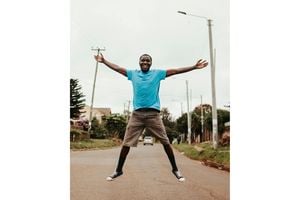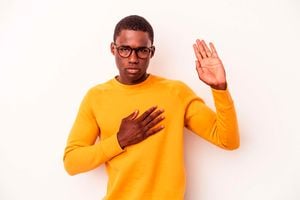
We are all sharing a drink called loneliness, but it is better than drinking alone.
Two words. That’s what I was thinking the other day when I couldn’t sleep, having watched every YouTube video there is. Those two words were, “Covid wewe!” Can I explain? I will explain. See, I wanted to get married (marry?) during the Covid period. This would’ve served two purposes, a) I would get married on a Monday because we were not promised tomorrow and “anyone could gerrit”—Covid, not the, er, other thing and b) I wouldn’t have to invite people because of “social distancing” and travel permits/embargo/ restrictions. Also, c) I would save on the honeymoon money because she was all the honey I needed, and besides, refer to b) above.
Everything was in place. All I needed was a bride, but at that time girls were perhaps not ready to get off the market. Soko was thriving na walikuwa mali safi. What I am trying to say is that I know what the president felt when he was rejected with his Finance Bill. The pandemic changed lives for good. How could it not? Anyone who tells you otherwise is trying to sell you something or probably works for the government of Kenya—most likely both.
It seems quaint now, I know, but it wasn’t supposed to be like this. Isolated in our homes for the better part of two years, we had a major cultural shift. Things went awry. Isolation was a seed that was watered by time spent alone. From it shot the leaves of anxiety, blossoming into fruits of mental health illnesses, and the flowers of suicide. What is suicide but a crime of loneliness?
I haven’t lived with someone’s daughter (or son) for an extended time. I stay alone. I cook alone. I eat alone. Okay, I eat alone while scrolling my news feed (see what I did there?) We have become an extremely lonely generation with loose ties to our ushago, and much weaker ties to our “online” friends. I have been lonely and no doubt I will be lonely again—the loneliness of the caged animal, which brings on crime, sex, alcohol, and other madnesses.
For days I have writhed in agony over this bed of glowing coals. My fear of heights had not restrained me from climbing the cliffs of my nerves. And the demons, finding the house unattended, had calmly strutted in through the open door. The loneliness was hitting me the way a hailstorm destroys a garden of flowers. This, I think, is what it feels like to be vastly interconnected but supremely disconnected. Apart from rather than a part of.
It’s an affliction that comforts my peers too, most of whom find it a near-death experience to live with someone, preferring instead to co-parent if they do have children, or as Sauti Sol told (lied) to us, “living apart together.” In our isolation, we have become intolerable to each other, our abundance of choice paradoxically leading to a lack of intimacy.
When I feel this way, I turn to my comfort read, William James’s essay “On a Certain Blindness in Human Beings,” in which he writes about the difficulty of being present to another person’s life. James uses a Robert Louis Stevenson story of young boys who form a secret club of “lantern bearers,” hiding small tin lanterns under their heavy coats as a secret emblem of participation.
When you meet them, they seem like anyone else hurrying by in the cold night. But when they meet one another, they lift the edge of their coats to reveal a hot burning light hanging from a belt loop. I find my face loosened every time I picture the lantern boys, connected and illuminated by the lamplight.
James revealed how hard it is to see someone else’s inner light—that thing that keeps them illuminated in dark times—especially when we are fixated on our own lives. We pass each other, focused on our lives and problems, never taking time to ponder the burning fire under the dark coat.
Some days it feels like we have been drowning in an ocean of sorrow and helplessness. Remember when I mentioned I had watched every YouTube video? I lied. I was actually flipping through videos of “Ghosts Caught on Camera”; “Can My Cat Hear Me Speak?” and “How do Porcupines Have Sex?” when I chanced upon a Jewish sacred text, the Mishnah, an Oral Torah that prescribes a dosage for the human condition: when your heart is broken, when the spectre of death visits your family, when it feels like your whole world is crushing down—when it is easier to get lost and retreat into yourself, then that is when you show up. You entrust your pain to the community. (Who needs therapy when you have an algorithm that knows you too well?)
In the Mishnah, thousands of Jews would pilgrimage to the Jerusalem temple. All who enter the Temple Mount would enter by the right, circle, and exit from the left, except for one who had suffered an incident, who would enter from the left. People would ask this person why he was going the wrong way.
He would reply: “Because I am bereaved.” They would say: “May the One Who dwells in this house comfort you.” Or he would say: “I have been banned.” They would say: “May the One Who dwells in this house put in their hearts to bring you close again.” Or perhaps: “My lover left. I was completely blindsided.” Those from the right would offer a blessing: “May the Holy One comfort you.” And it would go on and on. What they were really asking was, “What happened to you?”
My heart thawed in the warmth of their humanity. This is what it means to be human in a world of pain. Today you are in pain. Perhaps next year, it will be me. I hold your broken heart tenderly, knowing that one day you will hold mine. Tender gestures like these remind us of our flailing humanity—it encourages us to reach out, even when we would rather withdraw.
I know that’s counterintuitive in a world that props up the dogma of the “lone wolf” and “cutting off” and “fake friends”—the very symptoms of broken relationships. I have since learned that we become more human when we show up for others, and when we ask others for their kindness and support. Build community. Joy shared is doubled, pain shared is halved. A circle of love meets the circle of sorrow to transmit the power of healing.
Perhaps the Supreme Commandment is the one which isn’t a commandment at all: “Thou shall not withhold thyself.” Indeed. We are all sharing a drink called loneliness, but it is better than drinking alone.







